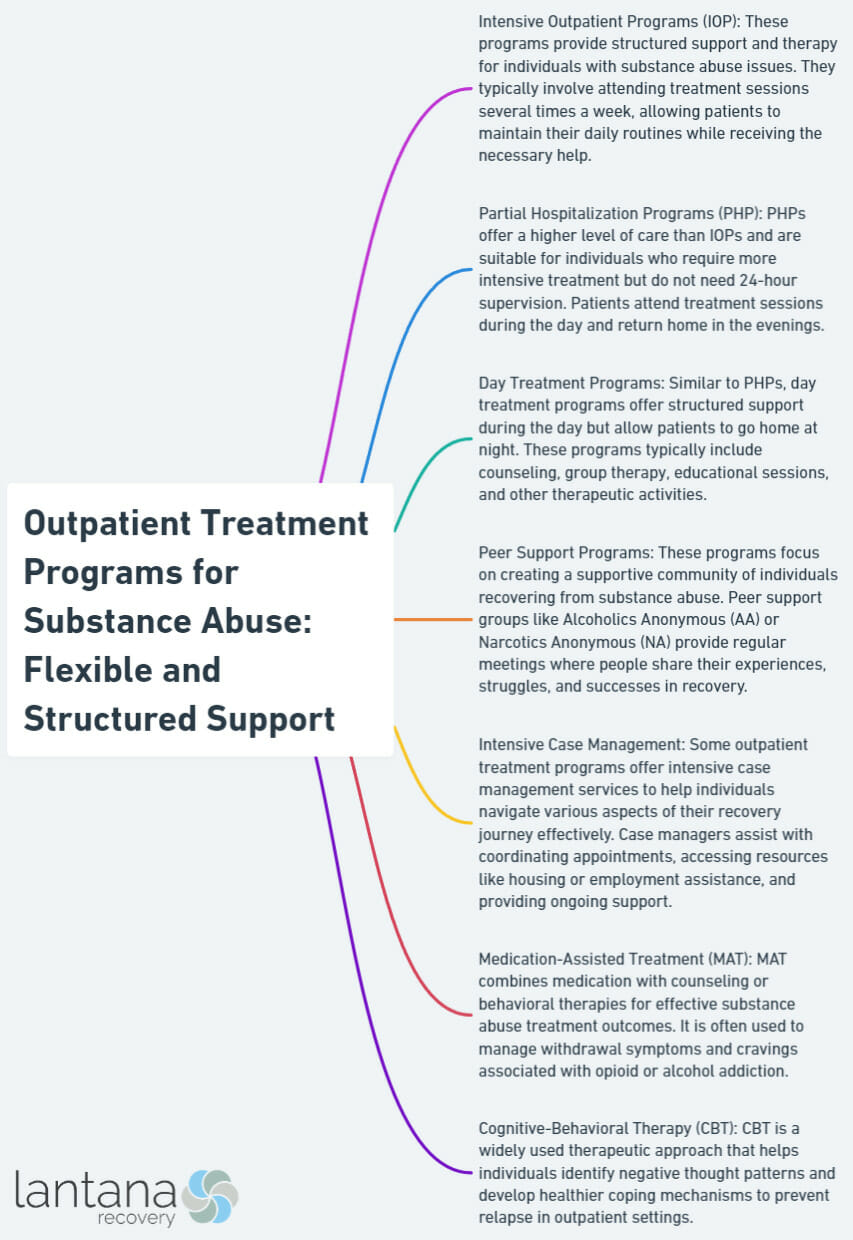Transitioning from rehab to life after treatment is a crucial and challenging process. It involves navigating various aspects of life while maintaining sobriety and building a strong foundation for long-term recovery. Understanding the transition and having a well-established aftercare plan are essential factors in ensuring a successful transition.
Creating a support network is a vital component of the aftercare plan. This network can include family, friends, support groups, and therapists who can provide guidance, encouragement, and accountability during the transition. Developing a routine helps establish stability and structure in daily life, reducing the risk of relapse. Maintaining healthy habits, such as regular exercise, proper nutrition, and self-care, also plays a significant role in supporting overall well-being.
Transitioning back into society involves reintegrating with family and friends, returning to work or school, and navigating social situations and triggers. Open communication, setting boundaries, and seeking professional help when needed can contribute to a smoother transition.
Dealing with challenges and preventing relapse requires recognizing and managing cravings, building coping strategies, and seeking support when facing difficulties. Celebrating milestones and achievements, no matter how small, can boost confidence and motivation. continuing with ongoing support and aftercare programs, such as counseling sessions or participation in support groups, can provide ongoing guidance and assistance in maintaining sobriety.
Navigating life after rehab can be overwhelming, but with proper planning, a supportive network, and effective coping strategies, individuals can successfully transition to a fulfilling and sober life.

Understanding the Transition from Rehab to Life After Treatment
Understanding the transition from rehab to life after treatment is crucial for maintaining long-term sobriety. Here are some key factors to consider:
- Continued Support: Stay connected to a support system by joining a recovery community or attending support group meetings.
- Relapse Prevention: Develop strategies to prevent relapse by learning coping skills, identifying triggers, and having an action plan.
- Establishing Routine: Create a structured daily routine to provide stability and purpose. Engage in healthy activities like exercise or hobbies for overall well-being.
- Setting Realistic Goals: Set achievable goals to feel accomplished and purposeful. Start with small goals and gradually work towards larger ones.
- Healthy Relationships: Surround yourself with positive and supportive individuals to enhance well-being. Cultivate healthy relationships and distance yourself from toxic influences.
- Self-Care: Prioritize self-care during the transition period. Practice mindfulness, engage in enjoyable activities, and take care of your physical and mental health.
By understanding the transition from rehab to life after treatment, individuals can navigate this crucial period with confidence and increase their chances of long-term success in recovery.
Fun fact: Research by James McKay from University of Pennsylvania exploring the impact of continuing care on recovery from substance use disorder shows that aftercare programs following rehab significantly lower the relapse rate compared to those without continued support.

Establishing an Aftercare Plan
Transitioning to life after rehab can be a daunting journey. In this section, we will explore the crucial step of establishing an aftercare plan. We will dive into the importance of creating a supportive network, developing a healthy routine, and maintaining positive habits. Join us as we uncover valuable insights and strategies to navigate post-rehab life with confidence and resilience. Remember, you aren’t alone in this process!
Creating a Support Network
Creating a support network is crucial for individuals transitioning from rehab to life after treatment. A strong support system can greatly contribute to successful recovery and long-term sobriety. Here are important steps to consider when creating a support network:
- Identify trustworthy individuals who can provide emotional, physical, and practical support throughout your recovery journey.
- Seek support groups or recovery communities where you can connect with others who have similar experiences and understand your struggles.
- Build relationships with positive and understanding friends and family members who can offer encouragement and accountability.
- Find a sponsor or mentor who has successfully navigated recovery and can provide guidance and support along the way.
- Attend therapy or counseling sessions to express your thoughts and emotions in a safe space while receiving professional guidance.
- Use online resources and forums to connect with individuals in recovery for additional support and understanding.
- Regularly engage in activities and hobbies that promote a sober lifestyle and surround yourself with like-minded individuals.
- Be open and honest with your support network about your needs, challenges, and progress. Communication is key in maintaining a strong support system.
- Continually cultivate and strengthen your support network by maintaining regular contact and showing gratitude for their support.
By creating a solid support network, individuals can increase their chances of overcoming challenges, staying motivated, and maintaining their sobriety long-term.
Developing a Routine
Developing a routine after rehab is crucial for maintaining sobriety and promoting a healthy lifestyle. Here are the steps you should take to establish this routine:
- Set a consistent wake-up and bedtime schedule.
- Begin each day with a nutritious breakfast to fuel your energy.
- Create a daily schedule that includes work, therapy sessions, support group meetings, and recreational activities.
- Make time for self-care activities such as exercise, meditation, or engaging in hobbies.
- Establish a routine for meals and snacks to maintain a balanced diet.
- Prioritize regular sleep patterns to ensure you get enough rest each night.
- Incorporate regular exercise into your routine to enhance your physical and mental well-being.
- Stay organized and maintain a clean living space.
- Include time for relaxation and leisure activities to reduce stress.
- Take breaks throughout the day to prevent burnout.
- Regularly connect with your support network for accountability and motivation.
- Practice mindfulness and gratitude as part of your daily routine.
- Learn and utilize healthy coping mechanisms for managing stress and triggers.
- Review and adjust your routine as necessary to effectively support your recovery goals.
By developing a routine, you foster stability, purpose, and structure in your daily life, which will greatly enhance your journey to recovery. Remember, it’s important to remain flexible and open to making adjustments, but consistency is key to long-term success.
Maintaining Healthy Habits
When transitioning from treatment, it is essential to maintain healthy habits for long-term recovery and wellbeing.
- Physical Health: Regular exercise, a balanced diet, and enough sleep are important for physical health. Exercise boosts mood and reduces cravings, while a nutritious diet provides essential nutrients for optimal functioning.
- Mental and Emotional Health: Prioritizing self-care activities such as journaling, meditation, or therapy enhances mental and emotional wellbeing. Engaging in these self-care activities can be immensely beneficial during recovery from substance use disorder, suggests a 2017 feasibility study published in Issues in Mental Health Nursing.
- Stress Management: Learn stress management techniques like deep breathing exercises or engaging in hobbies to prevent relapse and maintain wellbeing.
- Support Systems: Cultivate a strong support network of friends, family, or peers who understand your journey and can provide guidance and encouragement.
- Avoiding Triggers: Recognize and avoid situations, people, or places that may trigger cravings or negative behaviors.
- Continued Education: Stay informed and seek ongoing education about addiction, recovery, and mental health to prevent relapse and understand personal triggers.
One individual, let’s call him John, was committed to maintaining healthy habits after treatment. He focused on regular exercise, daily mindfulness meditation, and support group meetings. John also surrounded himself with supportive friends who understood his journey. With dedication and discipline, he maintained sobriety and achieved personal milestones in his recovery. John’s story highlights the importance of maintaining healthy habits and seeking ongoing support for a successful transition to life after rehab.

Transitioning Back into Society
Transitioning back into society after completing rehab can be a challenging and pivotal phase in one’s recovery journey. In this section, we’ll explore various aspects of this transition, including reintegrating with family and friends, returning to work or school, navigating social situations and triggers, dealing with challenges and relapse prevention, and the importance of seeking professional help when needed. These insights aim to provide guidance and support as individuals navigate their way towards a healthy and fulfilling life post-treatment.
Reintegrating with Family and Friends
Reintegrating with family and friends after completing rehab is essential for establishing a stable and supportive life. Here are some key considerations to keep in mind during this process:
- Rebuilding trust: It is crucial to acknowledge the pain caused by your addiction and take responsibility for your actions. Rebuilding trust takes time, but by being sincere and consistent in your actions, you can mend relationships.
- Open communication: Foster honest and open communication with your loved ones. Share your feelings, progress, and challenges, and be receptive to their concerns and feedback. Effective communication strengthens bonds and promotes understanding.
- Setting boundaries: Establish healthy boundaries with your family and friends to protect your recovery. Clearly communicate your needs and limitations and enforce these boundaries when necessary. This will help maintain a positive and supportive environment.
- Seeking support: Lean on your support network, which includes your family, friends, and fellow individuals in recovery. Regularly attend support group meetings or therapy sessions with your loved ones to strengthen relationships and create a space for shared understanding.
- Engaging in sober activities: Plan activities with your family and friends that promote sobriety and overall wellbeing. Engaging in sober hobbies or joining community organizations together can create positive memories and strengthen connections.
- Patience and forgiveness: Understand that rebuilding relationships takes time and patience. Be forgiving towards others and yourself, as setbacks may occur. Recovery is a journey, and progress is not always linear.
By prioritizing the building of trust, maintaining open communication, and surrounding yourself with a supportive network, you can successfully reintegrate with your family and friends, creating a solid foundation for your life after rehab.
Returning to Work or School
Returning to work or school after completing a rehab program is a crucial step in the recovery process. It allows individuals to reintegrate into society and rebuild their lives. Here are some factors to consider when returning to work or school:
- Supportive environment: Ensure that your workplace or educational institution understands your situation and provides support. This can include making necessary accommodations or adjustments to help you succeed.
- Open communication: Keep your employer or teachers informed about your recovery journey. This enables them to better support you and understand any challenges you may face.
- Establishing a routine: Create a structured routine that includes work or study time, self-care, and maintaining a healthy work-life balance. This will help you stay focused and prevent feeling overwhelmed.
- Seeking additional support: Consider joining support groups or seeking counseling services to complement your return to work or school. These resources can offer guidance and encouragement during times of increased stress or triggers.
Returning to work or school after rehab can be challenging, but with the right support and attitude, it is possible to rebuild one’s life and thrive in these environments.
If you are afraid that joining a rehab can result in you losing your job, consider reading our detailed article on can you lose your job for going to rehab for more information.
Navigating Social Situations and Triggers
Navigating social situations and triggers after rehab is crucial. With effective coping mechanisms, supportive boundaries, awareness of high-risk situations, a sober support network, and prioritizing self-care, individuals can successfully navigate social situations and avoid triggers while maintaining sobriety and promoting a healthy lifestyle. Research shows that individuals who engage in continued aftercare programs are more likely to maintain long-term sobriety and prevent relapse.
Dealing with Challenges and Relapse Prevention
Dealing with challenges and relapse prevention is crucial after rehab. Here are strategies to navigate these challenges:
- Identify triggers: Recognize the people, places, or situations that may trigger cravings or temptations to relapse. Understanding these triggers helps develop effective coping mechanisms.
- Build a support system: Surround yourself with a strong support network that includes friends, family, or support groups. They provide encouragement, guidance, and accountability during challenging times.
- Develop healthy coping mechanisms: Find ways to manage stress, anxiety, or negative emotions without using substances. Engaging in exercise, mindfulness, or hobbies helps cope with challenges positively.
- Establish healthy routines: Create a structured daily routine to reduce relapse chances. This includes regular sleep patterns, nutritious meals, and consistent exercise.
- Attend aftercare programs: Participate in aftercare programs and therapy sessions for ongoing support. These programs offer guidance, education, and tools to maintain sobriety.
- Set clear goals: Establish recovery-focused long-term and short-term goals. Clear objectives provide motivation and purpose while facing challenges.
- Monitor progress: Regularly evaluate personal progress and celebrate milestones. Documenting achievements serves as a reminder of progress and boosts confidence for future challenges.
- Seek professional help: Reach out for professional support when facing difficult challenges or relapse. Therapists, counselors, or addiction specialists provide guidance, strategies, and additional resources.
Seeking Professional Help when Needed
When transitioning back to life after rehab, it is important to recognize the value of seeking professional help. Professional help provides guidance, support, and tools to navigate challenges during this transition period.
- Enhancing recovery: Seeking professional help boosts the recovery process by providing tailored therapy sessions. These sessions address underlying issues or triggers that may cause relapse.
- Developing coping strategies: Professionals cultivate effective coping strategies to manage stress, cravings, and triggers. These strategies enhance well-being and reduce the risk of relapse.
- Providing a support system: Professional help at an outpatient rehab offers access to support groups or therapy groups. These groups create a community of understanding, providing encouragement and motivation.
- Identifying co-occurring disorders: Professional help is essential in identifying and managing any co-occurring mental health disorders. Addressing these disorders alongside substance abuse recovery is vital for long-term success.
- Offering guidance and resources: Professionals provide guidance on community resources, such as counseling centers, support hotlines, or specialized treatment programs. These resources offer ongoing support in maintaining sobriety.
Seeking professional help is a proactive step towards a successful transition. It ensures individuals have the necessary tools, support, and guidance to navigate challenges, increasing the likelihood of long-term recovery.

Celebrating Milestones and Achievements
Celebrating milestones and achievements is crucial after successfully completing rehab. It is essential to recognize and celebrate these milestones as they provide the motivation to continue on the path of recovery. One effective way to celebrate milestones is by acknowledging the number of days or months of sobriety achieved, such as reaching the 30-day or 1-year mark. Gathering with loved ones and friends to commemorate these milestones can significantly boost morale and provide much-needed support. Engaging in activities or hobbies that bring joy and a sense of accomplishment can also be a fantastic way to celebrate milestones.
For instance, pursuing a new passion or revisiting an old one like painting, cooking, or participating in sports can be truly fulfilling. Setting short-term goals and celebrating when they are accomplished is another way to mark milestones and acknowledge achievements. This could involve regularly attending therapy sessions or completing a specific number of AA meetings.
Participating in support groups and sharing accomplishments with peers who understand the journey can offer validation and serve as a source of inspiration. Research has shown that actively participating in such support groups enhances the chances of recovery and motivation to participate in the recovery treatment. “Active engagement in peer support groups has shown to be a key predictor of recovery and sustaining recovery.” (Benefits of peer support groups in the treatment of addiction, Tracy, Wallace, 2016)
It’s important to keep in mind that celebrating milestones is not only about recognizing achievements but also about acknowledging personal growth, self-awareness, and conquering challenges.

Continuing with Ongoing Support and Aftercare Programs
Continuing with ongoing support and aftercare programs is vital for individuals transitioning to life after rehab. These programs are crucial in providing tools and resources for maintaining sobriety and preventing relapse. Participating in outpatient treatment programs is one important aspect of continuing care. These programs enhance the chances of long-term recovery by offering counseling, therapy, and support groups regularly. They allow individuals to continue receiving professional guidance and stay connected with peers.
Sober living homes are another essential component of ongoing support and aftercare. These residences provide a structured and supportive environment for individuals in early recovery. They offer accountability, regular drug testing, and peer support, which help individuals adjust to independent living while being part of a sober community. Plus, sometimes, you can even get paid to go to rehab, read our article to find out how.
Attending support groups is also significant in maintaining sobriety. These meetings foster connection with others who have experienced similar struggles. Support groups provide a safe space for sharing experiences, exchanging advice, and reinforcing recovery principles.
Individual therapy is another crucial aspect of ongoing support and aftercare. Continuing with ongoing therapy sessions can boost emotional well-being and cultivate personal growth. Therapy addresses underlying issues, develops coping mechanisms, and focuses on relapse prevention strategies.
Engaging in wellness activities is equally important in maintaining sobriety. Regular exercise, meditation, and pursuing hobbies enhance overall well-being and provide healthy stress management outlets.
With the right ongoing support and aftercare programs, individuals can successfully navigate life after rehab, reducing the risk of relapse and building a strong foundation for lasting recovery.
*True History*: James, a recovering addict, successfully completed his rehab program and realized the significance of continuing with ongoing support and aftercare programs. He actively participated in outpatient treatment, attending therapy sessions twice a week. James also joined a local sober living home, finding support and friendship among fellow residents who understood his journey. He made a commitment to attend weekly support group meetings, finding inspiration and advice from others who had stayed clean for years. Through individual therapy, James worked through past trauma, developing healthy coping mechanisms and relapse prevention strategies. He discovered the benefits of practicing yoga and engaging in outdoor activities, which boosted his physical and mental well-being. By diligently embracing ongoing support and aftercare programs, James successfully transitioned to life after rehab, maintaining his sobriety and building a fulfilling and drug-free life.
Frequently Asked Questions
What is the first step to transitioning to life after rehab?
The first step to transitioning to life after rehab is to create a game plan. It’s important to have a solid strategy in place for maintaining sobriety, which may include identifying triggers, setting healthy boundaries, and establishing a support system.
Why is it crucial to involve family and friends in the transition process?
Involving family and friends in the transition after rehab can provide support and guidance. They can help create a positive and drug-free environment, offer encouragement, and be understanding of the challenges faced during the recovery process.
What resources are available for ongoing support after rehab?
There are various resources for ongoing support after rehab, such as online addiction counseling, individual counseling, 12-Step programs like Alcoholics Anonymous, and alternative support groups like SMART. SAMHSA’s National Helpline (1-800-662-HELP) can provide referrals to local treatment facilities, support groups, and community-based organizations.
How can a mental health professional help in the transition process?
A mental health professional can play a vital role in the transition process by providing regular check-ups, monitoring progress, addressing any mental health concerns, and offering support and guidance. They can help address underlying issues and provide resources for maintaining long-term sobriety.
What should be done to restore normalcy and build a new lifestyle after rehab?
To restore normalcy and build a new lifestyle after rehab, it’s important to make healthy decisions, avoid triggers and temptations, stick to a healthy daily routine, engage in drug-free hobbies, and join social groups that celebrate sobriety. Planning ahead and staying committed to daily sobriety is key.
How can state services help individuals transitioning to life after rehab?
State services, such as state-funded treatment programs and sliding fee scale facilities, can provide affordable or low-cost treatment options for individuals transitioning to life after rehab. SAMHSA’s National Helpline (1-800-662-HELP) can assist in finding local resources and connecting individuals with state services.









